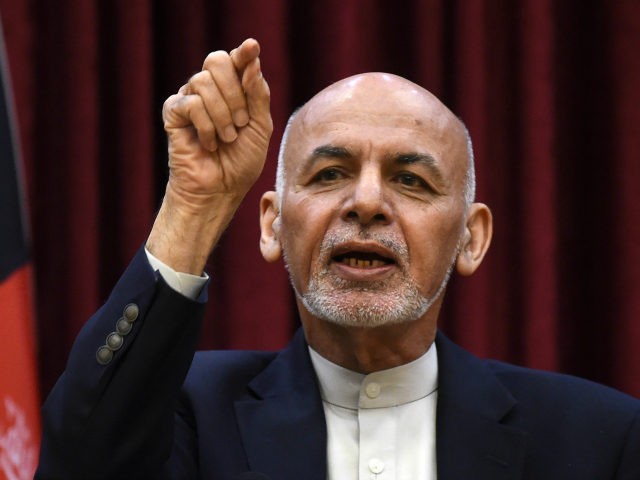Afghanistan’s President Ashraf Ghani presented his country to the 2020 United Nations General Assembly on Wednesday as a nation that has borne more than its share of turmoil and suffering, in everything from economic disruptions and climate change to the coronavirus pandemic and terrorism.
“Asia cannot integrate without us. We are right at the heart of untapped potentials that could bring prosperity and peace to our region. But this means that we are also right in the middle of the turmoil that is affecting us all today. We are experiencing the worst of it,” he said:
Ghani listed the five great current sources of global turmoil as the Chinese coronavirus pandemic, the “fourth Industrial Revolution” of the digital era, the “fifth wave of global terrorism,” climate change, and the “explosion of inequality.”
“The Covid-19 [Chinese coronavirus] pandemic has done for us what World War II did for generations before us,” Ghani said. “Both had such immense human costs and were phenomena that had such a global impact that then, and now, we are forced to pay attention and take unprecedented action.”
Ghani did not have much to suggest in the way of worldwide action on the economic displacement of the “fourth Industrial Revolution,” but he said Afghanistan is “experimenting with how to adapt so this digital revolution can be wielded as a source of economic opportunity for our overwhelmingly young population.”
He said it was important for Afghanistan to “look far ahead” as it modernizes so that it catches up with the state of the art around the world – a goal that will become exceedingly difficult if the Taliban returns to power and wrecks the budding Afghan educational system.
The Afghan president’s comments about terrorism and violence were surprisingly brief given his country’s long and grievous experience with the Taliban insurgency. He reaffirmed the “hard decisions” needed to begin peace talks with the Taliban but said they will not be enough because it is important to “get to the root of the terrorism blighting our region and address it as the global phenomenon and threat that it is.”
“The untold sorrow of the Afghan people, particularly our women and children, during the last 40 years serves as a reminder of the relevance of the U.N. charter and also of its unfulfilled promise of maintaining international peace and security,” Ghani said, delivering a considerably more dour assessment of the U.N.’s performance than most speakers at the General Assembly.
Ghani cited last month’s deadly floods and a devastating drought two years before that as evidence that Afghanistan suffers disproportionately from climate change. He said his government intends to pursue programs, such as hydroelectric, wind, and solar power to become “a hub for renewable energy and green industry in the region.”
As for the “explosion of inequality,” Ghani said only that Afghanistan is “focusing on human capital and human security to create the equality of opportunities for our fellow citizens and societal stability for our people.”
Ghani did not once mention the United States or its expensive and painful two-decade commitment to stabilizing Afghanistan and defending his government from the Taliban, nor did he discuss the impending withdrawal of U.S. troops. Instead, he stressed the important role of the United Nations and vaguely referred to “our international partners and allies,” as negotiations continue with the Taliban in Doha, Qatar.
Ghani promised to “invest in strengthening state governance structures to create an environment conducive to growth” by cracking down on “systemic corruption,” improving the Afghan financial systems, and making local government bodies more effective. He predicted this would help Afghanistan move from “donor relationships” to “mutually beneficial partnerships” with foreign entities.
Ghani concluded by calling on the U.N. General Assembly and Security Council members to “help us achieve the end state of a sovereign, united, and democratic Afghanistan, at peace with itself and the region, capable of preserving and expanding the gains of the last 19 years.”
“A democratically stable and prosperous Afghanistan will be an example of how our collective will can overcome the turmoil and uncertainty that defines our world today,” he hoped.

COMMENTS
Please let us know if you're having issues with commenting.